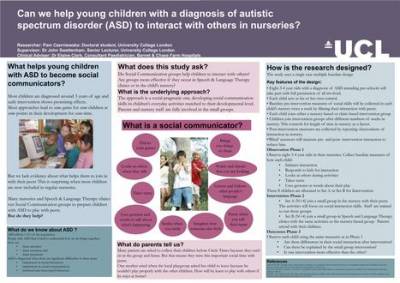| Researchers: | Pam Czerniewska, John Swettenham, Elaine Clark |
| Dates | Sept 2010 - Sept 2014 |
| Summary: |
| Download Poster |
Autism/autistic spectrum disorder (ASD) is a complex communication difficulty experienced by 1-2% of the population. It is diagnosed in children by assessing their social interaction and social communication, and by looking for restricted patterns of behaviour and unusual sensory processing.
Health services have become increasingly successful in identifying children with ASD as early as 2- 3 years. It is therefore possible to intervene early, targeting early communication skills with the aim of increasing opportunities for social interaction with others.
Previous early intervention studies, focussing on skills such as imitative play, joint attention and turn-taking have demonstrated some positive effects. However, these effects are transient and skills have often not generalised to new situations. Surprisingly, given that children will inevitably need to communicate socially in groups at nurseries and school, few studies have looked at the effectiveness of interventions in small groups.
The proposed study aims to evaluate an early intervention which is part of current clinical practice. Sixteen children, aged 3-4years and diagnosed with ASD, will be divided into either an intervention or a waiting-list group. The intervention group will receive 10 x 1 hour weekly sessions in small groups (N = 4) targeting social interaction abilities through structured routines and semi-structured table-top activities. The control group will receive treatment-as-usual (individual therapy sessions) followed by a 10 week block of small group intervention. Effects will be measured by (a) monitoring gains on targeted skills and (b) observing changes in social interaction behaviours at the children’s nurseries. Four children will be followed up in their nursery.
In a second study, four 3-4 year olds diagnosed with ASD will receive intervention in their pre-school setting in small groups consisting of one child with ASD and three typically-developing peers. These case studies will provide data on the effectiveness of within-nursery intervention with peers.
 Close
Close


